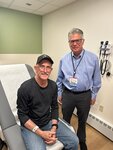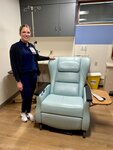Michael Ullery hails from Cumberland, Md., but comes to Chestnut Hill's new cancer center for treatment.
This item is available in full to subscribers.
We have recently launched a new and improved website. To continue reading, you will need to either log into your subscriber account, or purchase a new subscription.
If you are a digital subscriber with an active subscription, then you already have an account here. Just reset your password if you've not yet logged in to your account on this new site.
If you are a current print subscriber, you can set up a free website account by clicking here.
Otherwise, click here to view your options for subscribing.
Please log in to continue |


Michael Ullery, 69, hails from the small Appalachian city of Cumberland, Md. – walking distance, he says, from Pennsylvania’s southernmost border, but a three-and-a-half-hour drive from Chestnut Hill. Yet, it is to Chestnut Hill Hospital’s sparkling new Temple University Hospital-Fox Chase Cancer Center Ambulatory Care Center that Ullery, accompanied by his wife Denise, now comes for treatment of his rare neuroendocrine cancer.
Ullery, retired from his 33-year job with the state of Maryland and a proud grandfather of three, has undergone a series of unsettling medical encounters since his diagnosis. “It’s just a nightmare,” he says. “I’ve seen good doctors and I’ve seen doctors I would never want to see again.”
That frustrating quest for answers is over, and Ullery believes he is in good hands with Dr. Namrata Vijayvergia, a specialist in neuroendocrine cancers at Temple’s Fox Chase Cancer Center.
Michael Ullery’s medical odyssey began two years ago when the couple was living with their daughter in Texas. Ullery had an appointment to see a doctor for a follow-up endoscopy after 2006 surgery at Johns Hopkins for yet another rare cancer, a gastrointestinal stromal tumor.
The doctor he was seeing ordered a CAT scan before he performed the endoscopy. “He was a previous military doctor, and he was very straightforward,” Ullery recalls. “I got a call from him one afternoon at about 4:30, and he says, your CAT scan doesn’t look too good. You have cancer. I was like, what? Are you kidding me? And he said, I’ll see you tomorrow. Have a nice evening. Well, I didn’t have a nice evening.”
Neuroendocrine tumors, or NETS, affect an estimated four out of 100,000 adults in the United States, according to the National Cancer Institute. Ullery’s tumor was in the mesentery – a membrane that attaches the intestine to the stomach wall. As with many, if not most NETs, Ullery’s tumor was slow-growing, and he had no symptoms.
That diagnosis was the beginning of a long, frustrating journey. A series of specialist visits ensued, each with different and often conflicting recommendations. Treat the tumor with drug therapy, leave the tumor alone and watch and wait, have surgery to remove the tumor, don’t have surgery.
Ullery was at a loss. Then, the couple’s daughter, Jody Cantu – by that point living in the Baltimore area and a research scientist – applied her investigatory skills to the task of finding a specialist who could help her father get well. The trail led to Dr. Vijayvergia at Fox Chase.
The Ullerys drove to Fox Chase Cancer Center, still not knowing what to expect.
“Well, I’ve got to tell you, I was quite impressed,” says Ullery, “because it was clear that she had read everything. She had the scans up. She knew what the doctors in Texas did. And that’s very unusual. Usually, you fill out all that paperwork before you go to see the doctor and you walk in the room and they say, ‘What are you here for?’ She knows how to talk to you.”
Dr Vijayvergia started Ullery on a once-a-month injection of lanreotide – a long-acting synthetic hormone that slows tumor growth. Up to this point, Ullery has been receiving his shot at Fox Chase Cancer Center, but on June 21, Temple Health opened a new, state-of-the-art ambulatory care center in Chestnut Hill Hospital. Ullery is the center’s first patient.
Oncology nurse Jennie Gilliland is clinical director of infusion services at Fox Chase Main Campus and at the new Chestnut Hill facility, which occupies an expansive space on the ground floor in the rear of the hospital. There are seven examination rooms and 10 comfortable, oversized infusion chairs in quiet, private alcoves with dimmable lighting. At the center is a state-of-the-art nurses’ station, with monitors displaying each treatment room.
The center’s staffing is still ramping up, she says, and will boast a full complement of specialist nurses and physicians as the number of patients increases.
The center has been designed with patient privacy and comfort very much in mind. “It’s somewhat different from Main Campus, and we have a renovation plan in mind there, but this is designed to be a more serene experience here,” Gilliland says. “We’re really excited to be a part of the Chestnut Hill community and hope that the community is happy that we’re here, too.”
Dr. Martin Edelman, chair of Fox Chase’s department of hematology/oncology, says the new center will bring the same world-class cancer care available at Fox Chase Cancer Center to Chestnut Hill.
“Fox Chase Cancer Center is one of the country’s premier cancer centers,” he says. “We’ve had two Nobel Prize winners. We have state-of-the-art clinical trials, and it will be our faculty who will be here. We will be opening clinical trials here probably sometime next year, plus easy access to Fox Chase for more complicated studies. I think that will bring a higher level of care equal to anything patient could get anywhere else in this area. That’s a plus for everybody.”
New faculty have been recruited to staff the Chestnut Hill center, along with existing faculty members who will rotate through on a regular basis, Dr. Edelman says. And over the next several months, Fox Chase will greatly expand services at Chestnut Hill Hospital.
“In other words, while we have general hematology/oncology people and see a wide range of patients,” Dr. Edelman explains, “we will also have specialty clinics. So, for example, we will have people who focus solely on lung cancer, including surgeons.”
Fox Chase brings a world-class level of expertise to Chestnut Hill Hospital, he adds. “Cancer medicine has become far more complicated in the last 10 or 20 years – certainly since I was in training 40 years ago,” he says. “It’s very important to patients that they see somebody who is deeply familiar with all of the areas and what’s going on. I like to say, we don’t just practice by the guidelines. We write the guidelines. It’s not just that we’re aware of what’s going on; we’re the people who are creating that knowledge that goes into the guidelines. The drugs that are going to be used by your general hematologist/oncologist, you would have seen them at Fox Chase potentially five years earlier in clinical trials.”
All of that expertise is now going to be available at Chestnut Hill. “This is an absolutely state-of-the-art infusion center,” Dr. Edelman says. “You won’t get better care anywhere, period. If a patient is seen here and they need chemotherapy, immunotherapy, or targeted therapies for lung cancer, for example, we will be able to deliver all of that here.”
As for the Ullerys, who break up their trip with a stay at their daughter’s house, the appeal is much simpler. Chestnut Hill Hospital is easier to get to, but Michael Ullery does appreciate the new center, especially the enhanced privacy.
Mostly, though, as the survivor of not one, but two rare cancers, he is grateful to be here at all and receiving lifesaving treatment.
“I thought I was perfectly healthy,” he says. “If the doctor in Texas had just done the endoscopy and not the CAT scan, I still wouldn’t know.”